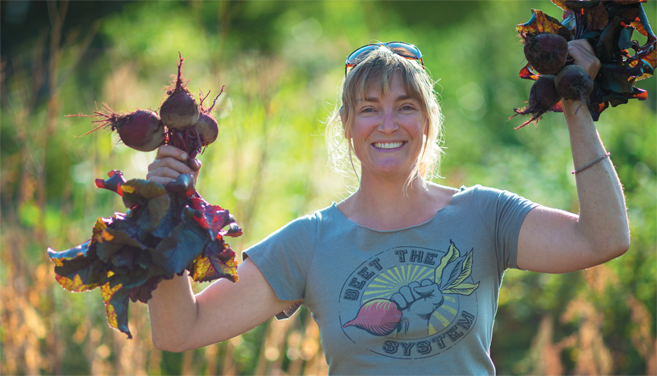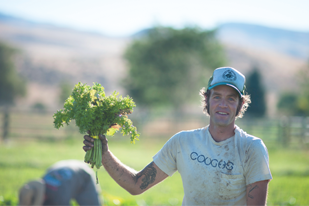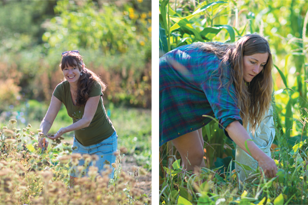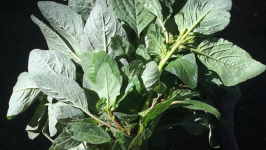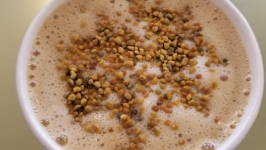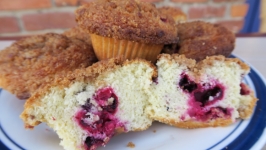Rooted Revolution
George W. Bush made me become a farmer. Or maybe it was Ani DiFranco. Or the anarchists who dropped the “American Disgrace” banner off Boise Cascade’s corporate offices in 2001, or possibly getting fired—again—this time from the Brick Oven Beanery. One thing is for sure: Choosing to start a farm was about a heck of a lot more than growing some vegetables.
In my angst-filled early 20s, I attempted to suss out a future “career” for myself amid what I saw as rampant environmental destruction, corporate-controlled government and systemic oppression. Like many people, I felt outraged at all the injustice around me and somewhat powerless to do anything about it. After several years volunteering for environmental and political organizations, I felt like big-money industry and their government puppets were setting the agenda and Iwas wasting my energy trying to shut down the horrible things they wanted to do.
I decided to turn and run as fast as I could in the direction I thought we needed to go, and let someone else waste their energy trying to shut me down. Organic farming was the most logical thing I could come up with. It combined care of the Earth with the opportunity to put my hands to good use, and to opt out of some of the industries I didn’t agree with by becoming more self-sufficient.
Fast-forward to today, where more people than ever seem to agree with some version of “We’re screwed.” As I write, the U.S. is shirking its responsibility to curb emissions in a time of runaway climate change. We’re living with the effects of an agricultural policy that subsidizes junk food and a health insurance system that profits off the resulting diseases. There’s a 6,400-square-mile dead zone in the Gulf of Mexico, where the Mississippi River, simply doing her duty of flowing downstream, has dumped the chemical runoff from thousands of Midwestern industrial farms. Depleted and polluted aquifers, rising income inequality, a broken democracy. Ugh.
“I got into organic farming through punk rock,” says Justin Moore, one of the owners of Fiddler’s Green Farm, a vegetable farm just outside Boise. “I mean, I studied ecology in college. I didn’t want to just go do stream ecology or something.” Instead, he looked upstream, to the source of our polluted rivers, for direction. “Farming connects all the pieces, everything I care about—localized economy, environmental stewardship, farmland preservation, health.”
At her East Boise Hoot ‘n’ Holler Urban Farm, Fiona Luray remembers her foray into farming. “It wasn’t the glamour, though I do enjoy the work. Based on the social and environmental climate, it feels necessary. We’re past peak oil. We’re getting only a quarter of the nutrients from food that’s shipped 3,000 miles to get to us. This is the future of a healthy system and healthy people. If we don’t do it, who will?”
Her partner Lettie Stratton agrees. “It’s about taking control of the things you can control. I can’t control what’s happening in the White House or in Russia, but I can control what I’m putting into my body, into the soil.”
Younger people staring down the barrel of wildly erratic weather and ever-greater inequality recognize the need to make a new way forward. Many of us see organic farming as a beautiful lifestyle but also very useful work, filled with intrigue and creativity, connection with natural cycles, and the satisfaction of knowing we are nourishing our neighbors through our efforts. As my own farm has shifted more into
seed production, I see the seeds I steward as little bundles of hope for the future as well as a positive contribution to my community in the
present. Every day I thank them for giving me something meaningful to do with my life.
Sure, this work could be seen as resistance. By creating a local seedshed, we are resisting the corporate takeover of our food and seed system,
the commoditization and patenting of life, shrinking biodiversity, genetic engineering for the profit of chemical companies—some of the
largest threats to human civilization. But I prefer to think of it as a solution. A wildly abundant, deeply gratifying solution.
Like Claire Opperman at Morning Owl Farm says, “Farming has definitely become political for me, but the real reason I do it is because I love interacting with the people I feed, sending all this good stuff out into the world.”


